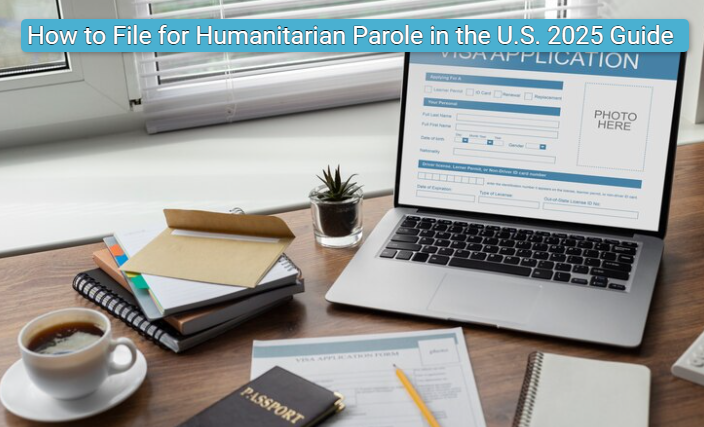How to File for Humanitarian Parole in the U.S. 2025 Guide

Introduction: Defining Humanitarian Parole
Humanitarian parole status is a special immigration provision that brings people temporarily into the United States. This status is based on urgent humanitarian reasons or substantial public interest. It’s not a path to permanent residence — it’s a way to respond to emergencies such as pressing medical requirements, reunification with family members, or escaping life-threatening situations.
The humanitarian parole program is monitored by USCIS, which reviews each application on a case-by-case basis. Individuals from war zones, those with emergencies while waiting for visa processing, or those requiring lifesaving treatment may be eligible under the immigration humanitarian parole category.
Who Is Eligible for Humanitarian Parole?

In deciding who is eligible for parole immigration, USCIS tends to look for individuals who:
- Are outside the United States currently,
- Do not possess a valid visa or are unable to wait for one,
- Are in the midst of an urgent crisis (medical, family, or personal safety),
- And offer compelling supporting documentation to support their request.
The procedure is also available to U.S.-based humanitarian parole sponsors, such as individuals or organizations, who make the application on behalf of the applicant. Whether the applicant is a child in need of emergency surgery or a parent seeking to reunite with family, humanitarian parole status provides a temporary lifeline.
Required Documents & Humanitarian Parole Form Submission
To apply for humanitarian parole, the main form utilized is Form I-131 or the Application for Travel Document. This is where the applicant (or sponsor) provides the basis for the request and attaches critical documents substantiating the claim.
Another accompanying form that is critical is Form I-134, the Declaration of Financial Support. It assures that a humanitarian parole sponsor is prepared and able to support the individual financially throughout his/her visit.
Other basic materials to include in your application:
- A photocopy of the applicant’s passport or identification
- In-depth explanation letter defining the imperative humanitarian grounds
- Treatment plans or hospital records in case of applying for a humanitarian visa USA for medical treatment
- Proof of relationship (for family reunification)
- Financial documents from the sponsor (tax returns, pay stubs, bank statements)
This documentation strengthens the case and aligns with immigration parole requirements set by USCIS.
How to Apply for Humanitarian Parole (Step-by-Step)

Here’s how to move forward with your application for humanitarian parole through USCIS:
- Complete Form I-131: Select Humanitarian Parole as the purpose. Provide all relevant details, including intended travel dates, port of entry, and contact info.
- Fill out Form I-134: This proves your humanitarian parole sponsor obligations will be met, primarily financial and logistical.
- Gather Supporting Documents: These are any letters for immigration from hospitals, family members, attorneys, or NGOs.
- Write a Clear Cover Letter: Describe the crisis, your urgent need for entry, and reference attached documents.
- Mail to the Proper USCIS Address: Forms must be sent to specific lockbox facilities, based on the sponsor’s place of residence.
This is a paper-only filing process, and currently, there is no online filing option for I-131 humanitarian parole.
Fees, Waivers & Filing Costs
As of 2025, Form I-131 has a filing fee of $630. For applicants requesting humanitarian parole upon arrival, the Form I-765 filing fee is $520.
Applicants who are facing financial hardship can ask for a waiver of fees by filing Form I-912 along with supporting documents. Although humanitarian reasons do not exempt applicants automatically from paying fees, fee waivers are issued on a case-by-case basis, particularly in situations involving humanitarian visa USA for medical treatment.
Parole Processing Time & Expedited Requests
While USCIS does not officially report normal processing times for Humanitarian Parole on their processing times website, you can expect to wait upwards of 1 to 2 years for approval (subject to change). However, processing times can differ depending on case complexity and USCIS workload. Delays are common due to the large number of parole requests, particularly in crisis areas.
Applicants can request expedited processing if their case presents an imminent danger to life or health. To request expedited processing, include:
- Time-sensitive documentation (e.g., scheduled surgery or medical certification)
- A clear description of the consequences of postponement
- A reference to USCIS expedited policies for urgent humanitarian reasons
If sending an email to the USCIS Parole Branch, include all forms and documents in a single bundled package. Knowing how to expedite USCIS cases is essential when urgency is involved. Also, be aware that advance parole humanitarian reasons can be different from regular parole requests and should be handled separately.
How to Get a Work Permit Under Humanitarian Parole

Once inside the U.S. on parole, applicants may apply for a work permit using Form I-765, choosing eligibility category (c)(11). This allows temporary work authorization while on parole.
To file:
- Submit Form I-765 and supporting documents (copy of I-94 or parole approval)
- Pay the $520 fee or submit Form I-912 to request a waiver
- Track case status through USCIS’s online tools after receiving the receipt notice
Remember, employment authorization is only good for the validity period of the parole and not beyond.
Can You Adjust Status from Humanitarian Parole?
Can a humanitarian parolee apply for a green card? Although humanitarian parole is not an immigrant visa, certain beneficiaries can become legal if they fall under specific USCIS categories.
Adjustment of status can only be accomplished by those who:
- Apply for and are granted asylum within one year of entry
- Qualify under Special Immigrant Visa (SIV) programs
- Are eligible for family-based sponsorship from a U.S. citizen or a green card holder
- Apply for other humanitarian relief (e.g., U-visa, T-visa, SIJS)
Attempting to file for a green card without meeting these criteria could result in denial or removal proceedings. A detailed strategy is required when exploring humanitarian parole adjustment of status.
When and Why to File a Humanitarian Letter for Immigration

The successful parole application is built around the humanitarian letter for immigration. Such a letter must:
- Outline the crisis or humanitarian situation
- Describe why the applicant cannot delay coming in for a visa
- Specify the role of the potential sponsor and support arrangement
- Include medical or political background, if necessary
Letters from licensed doctors, nonprofits, legal advocates, or government sources are given significant weight. This document helps USCIS assess the genuine urgency and public benefit of the case.
Conclusion: Act Quickly, Keep Yourself Informed, Seek Assistance
Applying for humanitarian parole can be a lifeline during an emergency. Whether you’re bringing a family together, coordinating emergency medical treatment, or rescuing a displaced person from harm, speed and accuracy are critical. Filing a thoroughly documented application with the proper forms, fees, and supporting documentation is your best hope for success.
Need Expert Help? File Smart with Immigration Pros
It is a sensitive and complicated process to navigate humanitarian parole. Visit Passage Law for customized expert legal advice personalized to your case. Our immigration lawyers are here to guide you forward with confidence and compassion.
DISCLAIMER: This article offers general legal information, not legal advice. Do not rely upon this information without seeking legal counsel. If you need legal advice, you may contact us directly to speak with an attorney. We disclaim all liability with respect to actions taken based on any information presented. Every case is different and outcomes will vary depending on the unique facts and legal issues of your case.
